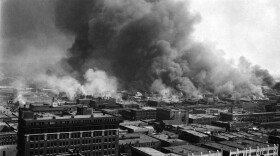A lawsuit in state court demands the City of Tulsa, Tulsa County and five other defendants address an ongoing public nuisance caused by the 1921 Tulsa Race Massacre.
The lawsuit argues a white mob razing the prosperous area known as Black Wall Street was just the beginning. It contends officials used funds intended to help the Greenwood District for other purposes, and used local policies to keep it from being redeveloped and owned by Black Tulsans, leading to an area poorer and in worse health than the rest of the city today.
Tulsa African Ancestral Society President Chief Egunwale Amusan said with the race massacre centennial less than a year away, now is the time to set things right.
"It would truly be a shame for the same entities to pretend to commemorate 100 years of injustice without providing measures — just measures — to right a century-old wrong," Amusan said.
The lead plaintiff is 105-year-old survivor Lessie Benningfield “Mother” Randle. The lawsuit makes a public nuisance claim, similar to what the state of Oklahoma did when it sued opioid manufacturers, winning a $572 million judgement in August 2019.
"And in that case, they went back 35, 40 years talking about how the nuisance was created and continued, and this is the same theory that we have," said attorney Damario Solomon Simmons. "It is no question that the nuisance was created, and as Mayor Bynum said recently and Mike Neal said recently, there's no question that the impacts of the 1921 Race Massacre is still impacting us today."
The lawsuit seeks for a judge to make an accounting of funds tied to Greenwood and audit property records to determine an amount for a victims compensation fund.






